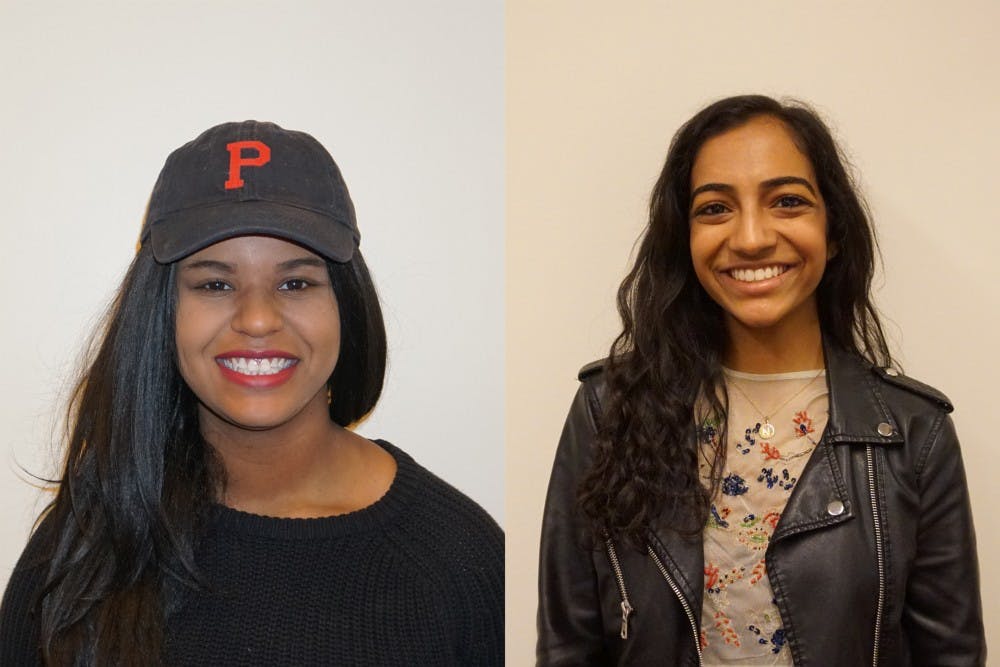
Maria Curry (left) and Natasha Menon (right).
The presidential candidates for the Undergraduate Assembly — College and Wharton junior Maria Curry and College junior Natasha Menon — faced off Monday night in the first of two debates to represent the student body.
The two candidates largely agreed on their top issues, such as the desire for greater transparency and an improvement of mental wellness on campus, but clashed with regards to what qualifications are needed to be elected UA president. Menon serves on the UA's executive board as treasurer, and Curry serves as chair of the UA’s Dining, Housing, and Transit committee.
Both Curry and Menon said the UA has an obligation to be more transparent, an initiative the assembly has focused on in recent months. But Curry criticized the lack of transparency in the UA budget, adding that she believes the UA executive board used revenue earned from their airport shuttles for “inappropriate services.” The UA offered reduced-fee airport shuttles for Thanksgiving and spring break this school year.
Curry said she and her running mate, vice presidential candidate and College sophomore Chase Serota, addressed this by introducing and passing an amendment to report revenue earned from their airport shuttle services in the UA’s annual budget report, which first took effect with the UA’s budget for the 2019-2020 academic year.
Menon pushed back by saying that she also endorsed this amendment as UA treasurer this year.
The candidates also agreed that the Counseling and Psychological Services embedded model, similar to the one in Huntsman Hall, should be expanded to other areas on campus to serve students regardless of their undergraduate school. The UA, led by Serota and College freshman Mary Sadallah, lobbied to change this in February.
Curry said she wants to bring CAPS services to a centralized location in Van Pelt Library and create mindfulness spaces across campus to help students de-stress, while Menon said she hopes to bring CAPS clinicians to places “where marginalized communities congregate,” such as the ARCH building or the Penn Women’s Center.
“If your first interaction with someone from CAPS is with someone who looks like you, then you’re more likely to seek the support you need,” Menon said.
Resources for cultural groups were also frequently debated, with both candidates promising to work to create more designated space for them.
The three cultural centers — the Pan-Asian American Community House, Makuu, and La Casa Latina — are all located in the basement of the ARCH building. Penn's main minority group coalition, known as the 6B, have pushed for more space.
Curry called the housing of the cultural centers in the ARCH basement “ridiculous and absurd,” pledging to work with Penn's donation office to encourage donors to specifically support the cultural centers on campus.
Currently vacant space can also be used to support cultural groups, Menon said, such as the second or third floor of Houston Hall. Menon added that more spaces to “celebrate intersectional identities” should be created.
The candidates notably diverged on what their biggest respective qualifications for the presidency are.
Menon said she and her running mate, vice presidential candidate and College junior Brian Goldstein, will capitalize on their prior experience serving on the UA’s executive board.
“We’ve created the relationships and have the institutional knowledge to execute our platform,” Menon said.
Curry countered by saying that “experience is more than a title.” She cited her ability to complete projects such as helping to create and promote the ride-sharing app Penn Rides on Request as her biggest qualification.
The Nominations and Elections Committee hosted the April 1 debate and accepted question submissions from the public. The debate consisted of questions about the candidates’ platforms and policy ideas, as well as a brief lightning round to showcase their personalities. The presidential candidates will debate a second time on Tuesday night, which will immediately be followed by a vice presidential debate. The voting period which started April 1, will end April 4 at 5 p.m.
The Daily Pennsylvanian is an independent, student-run newspaper. Please consider making a donation to support the coverage that shapes the University. Your generosity ensures a future of strong journalism at Penn.
Donate







